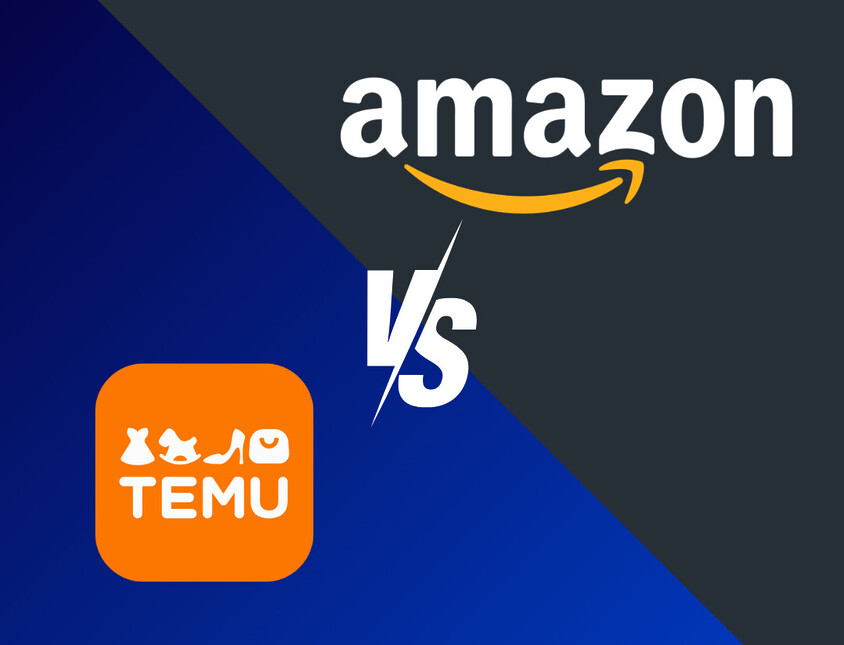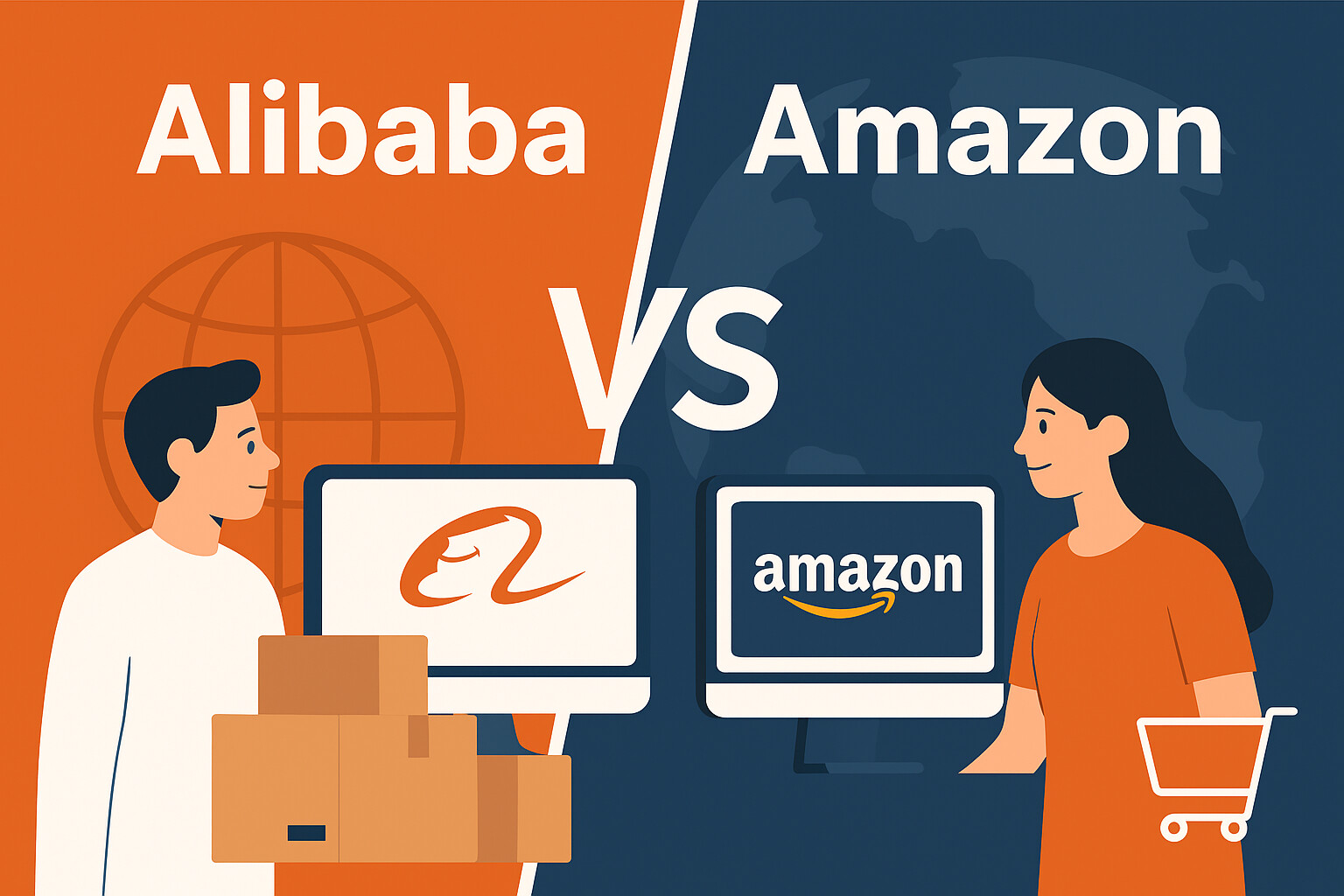Temu vs. Amazon – Why Amazon Remains Top Choice for Buyers and Sellers

Companies like Temu and Shein have challenged the longstanding reign of e-commerce giants and household names such as Amazon, eBay and Etsy. These new competitors entered the market with a mix of aggressive tactics and absurdly low prices that other platforms had trouble matching – at first that is. In response, Amazon for example launched initiatives such as Amazon Haul, where buyers can find similarly low-priced items – albeit with the promise of higher quality. This article takes a closer look at how the Temu vs. Amazon competition is going and explains why buyers and high-level sellers remain loyal to Amazon even though companies like Temu have shaken up and may have even changed the e-commerce industry for good.
TL;DR
Temu = ultra-low prices, razor-thin margins, long shipping times, limited branding.
Amazon = higher margins, fast logistics (FBA), trusted quality, strong branding tools.
Target audience differs: Temu attracts price-sensitive bargain hunters; Amazon attracts loyal, quality-focused repeat buyers.
Amazon Haul competes with Temu on price but keeps Amazon’s advantages in returns and trust.
Bottom line: Temu is cheaper, but Amazon remains stronger for brand building, reliability, and long-term growth.
The Direct Comparison – Amazon vs. Temu
In this section, we’ve listed all the key factors both platforms offer that are relevant to you as a seller.
Pricing Strategy and Margins
Temu’s business concept is providing products at extremely low prices, which in turn means razor thin margins for sellers. While it now also allows local businesses, small businesses, and individual entrepreneurs to sell on the platform, the main priority is set on direct-from-factory selling. Dropshipping is also not permitted.
Amazon, on the other hand, provides more leeway for profit-oriented sellers. While being known for dynamic and competitive pricing, Amazon also leaves room for solid margins of up to 25 % – 30 % (as opposed to Temu’s 2 % – 5 %)
Fulfillment and Logistics
Depending on the item’s origin, warehouse location, and logistics provider, deliveries on Temu can take anywhere from a few days to several weeks to reach the buyer. This is hardly a strong selling point for the platform and puts additional pressure on you as a seller to secure reliable and fast 3PL providers.
Amazon, on the other hand, is internationally recognized for its speed, having coined the term same-day delivery and being able to back it up with an unparalleled logistics network. Thanks to its extensive infrastructure, shipping through Amazon FBA is often not only faster but also more cost-efficient than relying on multiple providers – saving you both administrative time and effort.
Product quality is the biggest pitfall when it comes to shopping on Temu. The discrepancies between what the buyer sees online and what he/she receives at home are sometimes so astronomical, that the internet community has started making memes about it.
Temu vs. Amazon – from a quality perspective – is a very clear win for Amazon. Being able to rely on quality products not only speaks for customer care of the platform, it also signals to the buyers that repeat business is safer on Amazon.
Branding and Differentiation
As a seller, how important is being able to communicate your product’s story to you? Amazon gives you the tools to do just that. With features like A+ Content and Sponsored Brand ads, Amazon enables you to present not just your products, but the narrative behind them. Temu, on the other hand, is far more transactional. The platform’s focus is on low prices and fast-moving deals, making it difficult for you to stand out or communicate brand values.
Target Audience
Depending on who you are selling to, Amazon and Temu offer different benefits. With Temu’s low-price guarantee, your typical target audience will likely be more price-sensitive consumers, such as younger shoppers. On Amazon, especially when targeting Prime members, your audience consists of repeat buyers who expect speed and quality – and who reward sellers with loyalty and higher margins.

Amazon Haul vs. Temu
Amazon didn’t wait long to come up with a response for Temu and other discounter platforms. Only two years after Temu was founded, Amazon launched the beta version of Amazon Haul.
Currently only available only in the U.S. and U.K., this mobile-app-exclusive section focuses on the same audience that Temu services. Ultra-low-priced, impulse-buy products – mostly under $10, with many priced at just $1–$3.
Unlike traditional Amazon shopping, Haul products ship within 1–2 weeks and qualify for free shipping on orders over $15. Returns are simple and handled through Amazon. This is a huge advantage over competitors like Temu or Shein.
Haul presents both risks and opportunities if you are a seller. On the one hand, Amazon Haul may increase price pressure on Amazon from within due to its extremely low pricing. It may also lead to reduced visibility for your standard listings, and squeeze your margins. On the positive side, Amazon Haul may present itself as a great channel for clearing overstock, testing products, or reaching new audiences with budget-friendly items. Sellers who prepare early may gain an edge as Haul expands, especially in Europe.
Read our article on Amazon Haul Explained to find out how the new format could benefit your business.
Which Platform Is Right for You?
Temu and Amazon are two fundamentally different e-commerce platforms, and the right choice largely depends on your business model and goals. With its low priced and trend-driven shopping, Temu is attractive for you if you are a manufacturer, wholesaler, or a seller who can operate profitably at razor-thin margins. This means, if your products are low-cost, fast-moving, and easily sourced in bulk, Temu offers quick access to a highly price-sensitive audience, especially younger shoppers hunting for deals.
Amazon, on the other hand, holds the clear upper hand for you if you prioritize brand building, quality, and long-term customer relationships.With A+ Content, and Amazon Brand Story the e-commerce leader enables you – as a brand owner and/or private-label seller – to communicate your product’s story in the best way possible. What’s more, Amazon FBA enables you to deliver reliably, and win customer loyalty. Amazon is especially well-suited for businesses that want repeat buyers and are willing to invest in reputation and service.
Final Thoughts
Companies like Temu and Shein have proven that today’s consumers – especially younger shoppers – are often willing to trade speedy delivery for savings. They enjoy browsing cheap, trendy products in a mobile-first environment. This shift in buyer behavior has not gone unnoticed by Amazon.
Amazon’s response with Amazon Haul shows just how seriously it takes Temu’s rise. The message is clear: low-cost, impulse-driven shopping is here to stay. But here’s where you, as an Amazon seller, still hold the advantage. Amazon’s greatest strengths lie not only in competitive prices, but in trust, fast fulfillment, product quality, and the ability to build real brands that customers return to again and again – things Temu cannot yet guarantee.
Let’s also remember one thing: not all competition is bad. Quite the opposite, really. Platforms like Temu push Amazon to innovate, which benefits buyers first and foremost – but also creates new opportunities for sellers. The hope now is that Amazon recognizes what you already know: giving sellers more freedom in marketing and branding doesn’t weaken Amazon’s control, it strengthens the marketplace. When sellers can tell their story, showcase their products, and grow their brand, everyone wins – customers, sellers, and Amazon itself.
So, is Temu cheaper than Amazon? Yes. Does that mean Temu will put Amazon sellers out of business? Most certainly not.
FAQs
That depends on what you’re looking for. Temu is better if you want ultra-cheap, trendy items and don’t mind slower shipping or variable quality. Amazon excels in fast delivery, reliable service, brand selection, and returns. Ultimately, it depends on what matters more: saving money and variety (Temu) or speed, trust, and consistency (Amazon).
Amazon offers sellers unmatched global reach, strong brand trust, and advanced tools like FBA and Brand Registry. With fast shipping, reliable customer service, and higher buyer confidence, sellers can scale sustainably, build brand value, and enjoy long-term growth. For serious e-commerce businesses, Amazon remains the stronger, more reliable platform.
Not exactly. Temu and Amazon both sell a wide range of products online, but the experience is different. Temu focuses on ultra-low prices, flash deals, and unbranded goods, often shipped from overseas with longer delivery times. Amazon prioritizes speed, reliability, brands, and strong customer service—usually at higher prices.






